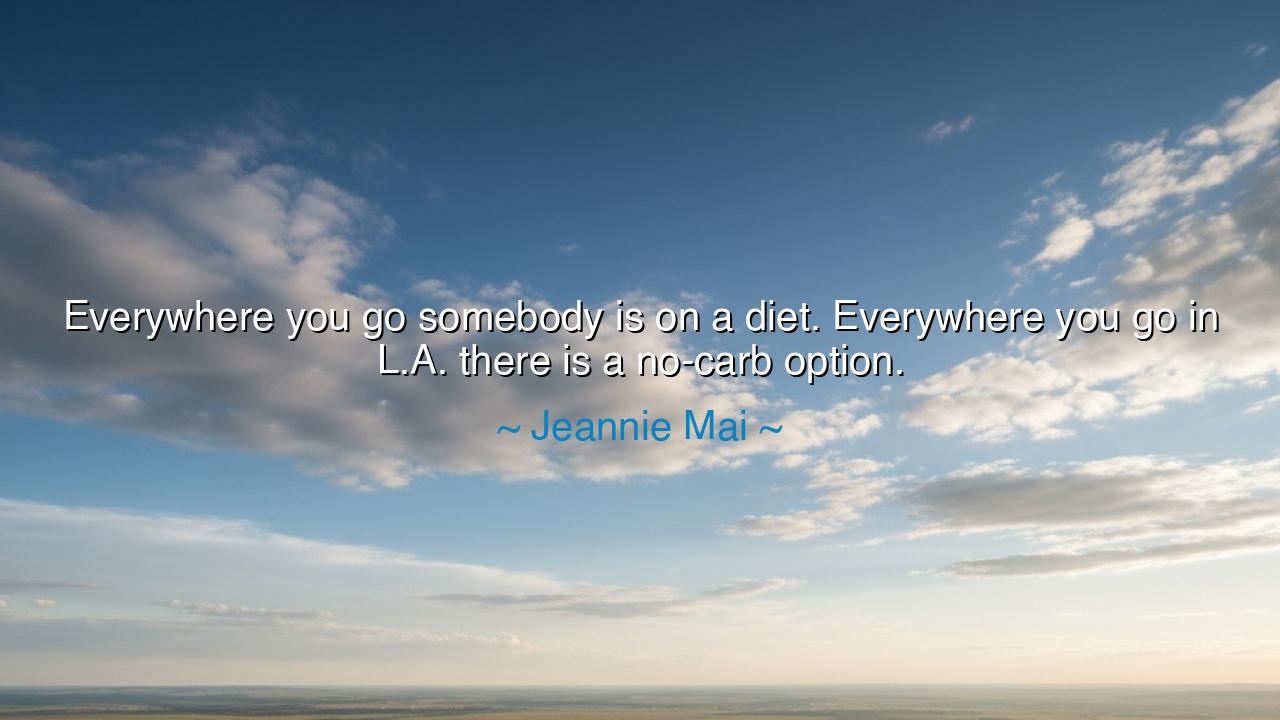
Everywhere you go somebody is on a diet. Everywhere you go in
Everywhere you go somebody is on a diet. Everywhere you go in L.A. there is a no-carb option.






In the bustling cities of the modern world, where the hunger for perfection often eclipses the pursuit of true fulfillment, we find ourselves surrounded by a peculiar phenomenon: the ever-present diet. It is as though a spell has been cast upon the people, binding them to a belief that their worth lies in their appearance, in the size of their body, or in the fleeting trends of the moment. This, as Jeannie Mai so insightfully observes, is the world in which we live: "Everywhere you go somebody is on a diet. Everywhere you go in L.A. there is a no-carb option." These words, though light in tone, speak to a deeper truth—the constant chase for perfection through restriction, through the denial of the body’s natural cravings. And in this, we must ask ourselves: What is the cost of such pursuits?
From the ancient days, when the great minds sought wisdom and balance, there was an understanding that the body is a vessel for the spirit, a sacred temple that must be nourished, not punished. Yet today, we see the diet as a means to an end, a tool for achieving a fleeting image of perfection. The philosophers of old would caution against such extremes, reminding us that the human body is not a machine to be tinkered with endlessly, but a living entity that requires nourishment, movement, and rest in balance. To restrict or deprive oneself excessively is not the path to wisdom, but to suffering. The Greeks were known for their balanced approach to life, seeking the golden mean—the middle way between excess and deficiency. To live in harmony was to embrace both the pleasures and the disciplines of life, recognizing the value in both.
Yet, as Jeannie Mai rightly points out, our modern world is obsessed with extremes. In the land of dreams, where the sun kisses the sky and the streets are filled with the glitter of ambition, the pursuit of perfection has taken a strange and dangerous form. The no-carb options are not just a mere food choice; they represent a mindset, one that seeks to eliminate, to control, to restrict. And in this endless pursuit of control, we lose something crucial—the ability to listen to our bodies, to honor our natural rhythms and needs. We become slaves to a narrative that tells us we must be something other than what we are, pushing ourselves to fit into molds that were never meant for us.
The great Socrates, though not a man of the body but of the mind, understood the danger of excess. He spoke of the need for balance, for moderation in all things. Even in the pursuit of knowledge, he cautioned his students not to become consumed, but to remember that the body and the mind must work in harmony. He would often partake in simple meals, showing his disciples that nourishment does not need to come in the form of excess or sacrifice, but in balance. Similarly, the ancient Romans—though known for their opulence and indulgence—understood the value of moderation in eating. The emperor Marcus Aurelius himself would remind his people to “be content with a little,” for in simplicity, there was great strength.
Jeannie Mai's observation, though it speaks of the absurdity of constant dieting, also points to a deeper truth: the obsession with appearance, with external validation, has clouded our ability to honor the body for what it truly is. It is not a vessel for perfection, but a vessel for life. This overemphasis on diets, on cutting out entire categories of food, blinds us to the true purpose of nourishment. Food, in its truest form, is meant to sustain the body, to provide the energy necessary for movement and growth, not to serve as a tool for control or self-denial. To treat the body with respect and kindness is to honor its needs without succumbing to the extremes of modern culture.
There is a lesson here that must not be ignored: we must reclaim the power of moderation. Just as the ancient warriors of Sparta trained their bodies with dedication and focus, yet found time to enjoy feasts in honor of their victories, we too must strike a balance in our lives. Diet and exercise are not the enemies of the spirit; it is when they are wielded as tools for punishment or perfection that they become harmful. The true warrior does not starve themselves, nor do they indulge recklessly. They eat to fuel their strength, move to sharpen their bodies, and rest to restore their souls.
In your own life, I urge you to find the path of balance. Do not fall into the trap of the endless diet, nor the obsession with body image that leads only to frustration and self-loathing. Instead, focus on the nourishment of the body, the movement of the soul, and the joy of living freely. Recognize the importance of both discipline and pleasure, and seek out the wisdom of the ancients, who knew that moderation was the key to true vitality. When we can listen to the needs of our bodies without shame or guilt, when we can eat not to punish but to fuel, then we will know true strength.






AAdministratorAdministrator
Welcome, honored guests. Please leave a comment, we will respond soon